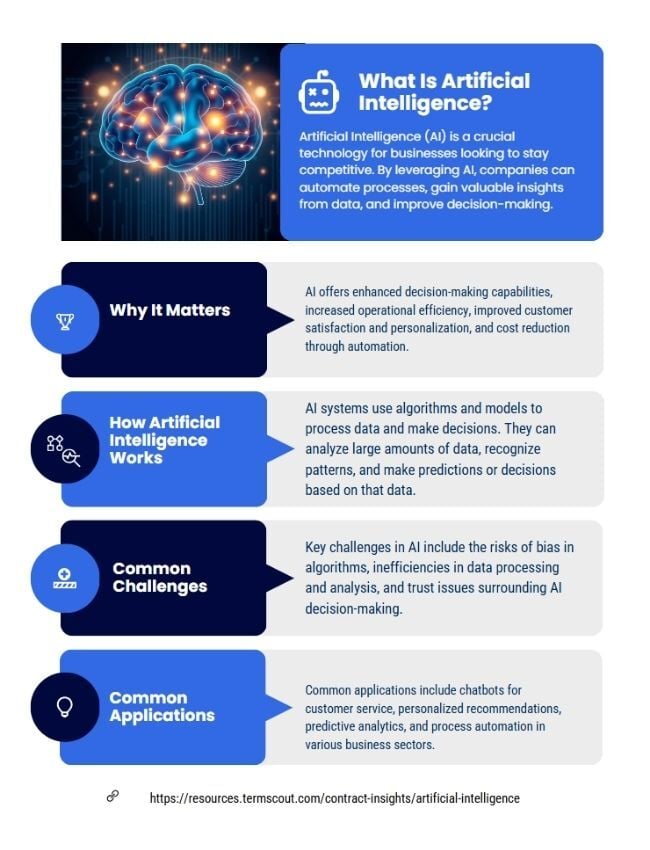Artificial Intelligence: Definition and Importance in Business
Get a Demo.jpg)
Artificial intelligence (AI) is reshaping how organizations work, analyze data, and make decisions. From automating contract analysis to improving operational accuracy, AI helps businesses enhance efficiency, reduce risk, and accelerate decision-making. Understanding what artificial intelligence is, how it works, and its applications is essential for any team looking to leverage technology strategically.
What Is Artificial Intelligence?
Artificial intelligence (AI) refers to computer systems designed to perform tasks that typically require human intelligence. These tasks include learning from data, reasoning, recognizing patterns, and making predictions. In business and contract management, AI enables faster, data-driven decisions by transforming unstructured text into structured insights. An artificial intelligence definition often includes techniques like machine learning, deep learning, and natural language processing (NLP).
In practical terms, AI allows software tools to understand, classify, and evaluate large volumes of data or documents, helping teams identify trends, measure fairness, and benchmark performance more effectively. This ability to process and analyze contracts or business documents at scale makes AI a powerful ally for organizations aiming to reduce friction and boost transparency.
Why AI Matters
-
Artificial intelligence matters because it transforms how businesses operate, innovate, and deliver value. It reduces manual workloads, enhances accuracy, and empowers teams to make informed decisions faster. In the context of contract intelligence and business operations, AI provides measurable advantages:
-
Automation: Streamlines repetitive tasks like data extraction or clause identification, saving valuable time for teams.
-
Accuracy: Reduces human error in analyzing contracts, ensuring consistent results and compliance.
-
Transparency: Provides visibility into complex data, helping stakeholders understand risks and opportunities.
-
Efficiency: Accelerates deal cycles by identifying non-standard terms or outliers early in the process.
-
Trust: Builds confidence in business decisions through structured insights and verified benchmarks.
-
How Artificial Intelligence Works
AI works by combining data, algorithms, and computational power to recognize patterns and make decisions. Modern AI systems use machine learning (ML) and natural language processing (NLP) to understand and process human language in documents like contracts or reports. These systems are trained on large datasets, allowing them to identify similarities, detect risks, and extract critical terms or metrics.
For example, TermScout’s Certify™ uses advanced models to analyze contract language, benchmark it against thousands of real-world agreements, and generate independent fairness ratings. This enables teams to see whether a contract is balanced, customer-favorable, or vendor-favorable, helping them move faster and make smarter decisions.
Real-World Applications of Artificial Intelligence
AI is applied across industries in both operational and strategic roles. In business settings, it supports multiple use cases:
-
Contract Analysis: Extracting and benchmarking contract clauses to assess fairness and compliance.
-
Fraud Detection: Identifying suspicious patterns or anomalies in financial transactions.
-
Predictive Analytics: Forecasting performance, sales trends, or negotiation risks.
-
Customer Support: Powering chatbots and automated help systems for faster response times.
-
Content Generation: Assisting with summaries, insights, and structured reporting from large datasets.
These artificial intelligence applications extend to sales, legal, procurement, and finance teams, allowing them to reduce time spent on manual reviews while improving accuracy and consistency across processes.
Common Challenges in Artificial Intelligence
While AI offers transformative benefits, it also presents challenges businesses must address to ensure accuracy, ethics, and trust in outcomes:
-
Data Quality: AI results depend heavily on the quality and representativeness of the data used for training.
-
Interpretability: Some AI decisions are difficult to explain, especially in highly regulated industries.
-
Security and Privacy: Handling sensitive contract or customer data requires robust protection protocols.
-
Over-Reliance: Without human validation, AI outputs can miss context or subtle legal nuances.
- Implementation Costs: Integrating AI systems with existing workflows can be resource-intensive initially.
Examples of Artificial Intelligence in Business
Examples of artificial intelligence include contract intelligence platforms, recommendation systems, AI-driven document review tools, and machine-learning-powered analytics dashboards. In the contract space, tools like TermScout Predict™ and TrustMark™ use AI to analyze terms, predict negotiation friction, and benchmark agreements, enhancing trust and efficiency in deal-making.
Across sectors such as finance, healthcare, and technology, AI improves decision-making, reduces risks, and unlocks new business models. These artificial intelligence examples demonstrate how the technology has moved from theory to everyday impact in modern enterprises.
Discover Contract Intelligence Powered by AI
TermScout applies artificial intelligence to contract analysis, enabling businesses to evaluate fairness, benchmark terms, and close deals faster.
Get Started Now
Artificial Intelligence FAQs
How artificial intelligence is used in business?
Artificial Intelligence involves the use of algorithms and models to simulate human intelligence processes like learning and reasoning. In business, AI is utilized for automating processes, gaining insights from data, and improving decision-making.
How can artificial intelligence benefit my company?
AI can benefit your company by enhancing decision-making capabilities, increasing operational efficiency, improving customer satisfaction and personalization, and reducing costs through automation.
What are some common applications of artificial intelligence in the business world?
Common applications of artificial intelligence in the business world include chatbots for customer service, personalized recommendations, predictive analytics, and process automation.
How does artificial intelligence work and what are the key components?
Artificial intelligence works by using algorithms and models to process data and make decisions. Key components include machine learning, neural networks, and natural language processing.
Can artificial intelligence help improve decision-making processes in a business setting?
Yes, artificial intelligence can help improve decision-making processes in a business setting by analyzing data, recognizing patterns, and making predictions or decisions based on that data.
What are some real-life examples of artificial intelligence being used successfully in business?
Real-life examples of AI being used successfully in business include personalized recommendations on e-commerce websites, fraud detection in financial transactions, and predictive maintenance in manufacturing.
Explore More Contract Insights
Get benchmarks, FAQs, and clear explanations that make contracts more transparent.
Visit Hub.png?width=130&height=53&name=Vector%20(21).png)